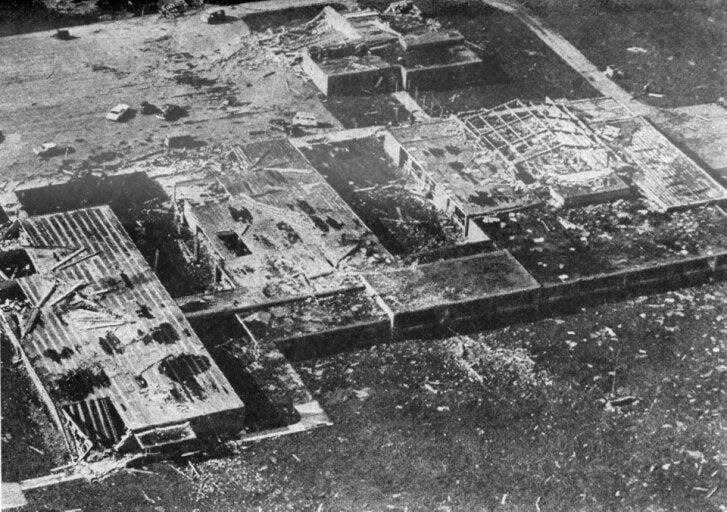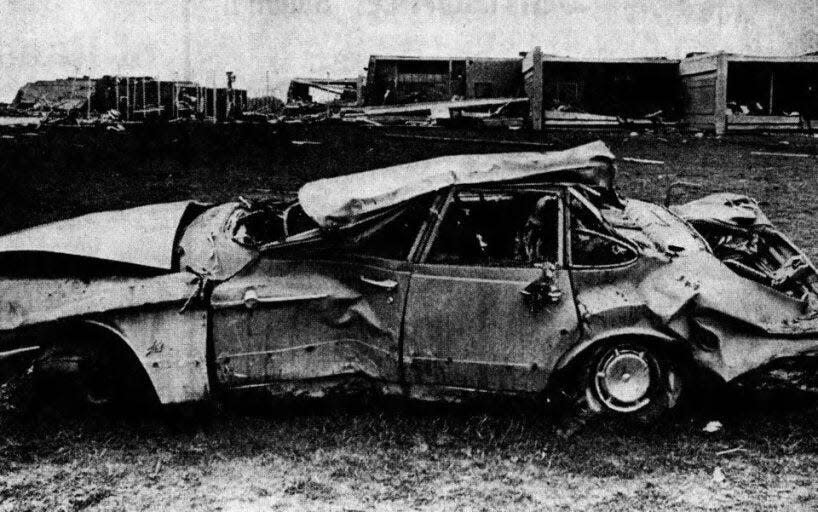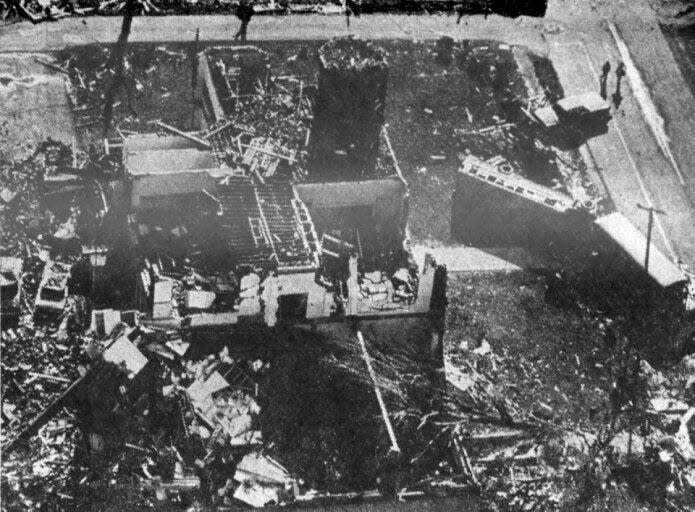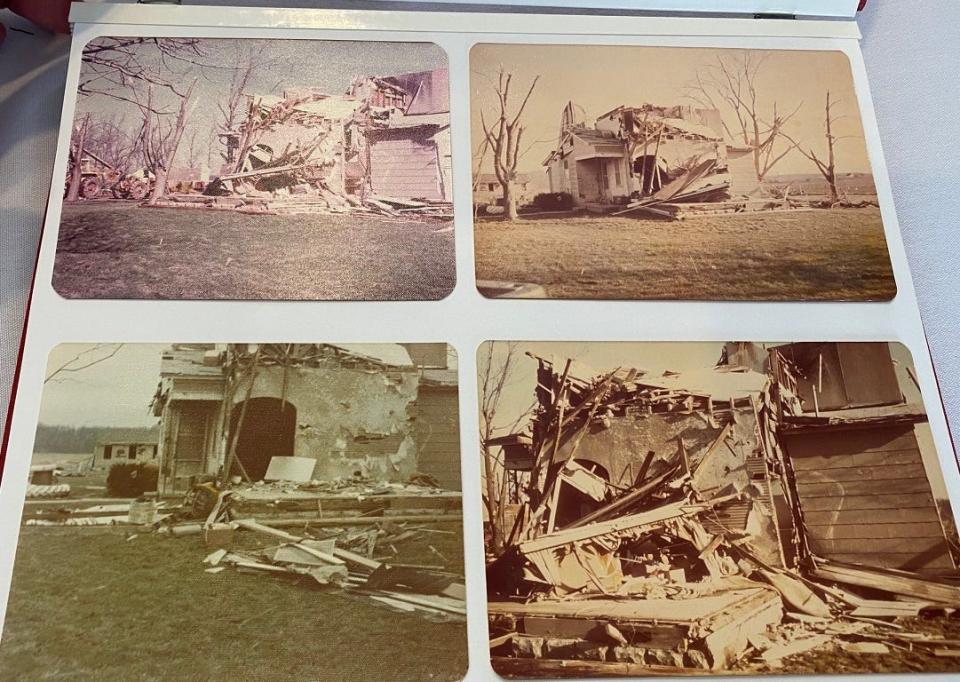50 years later, 1974 tornado that devastated western Randolph County remembered
PARKER CITY, Ind. — For those beyond a certain age, the memories of a turbulent and tragic afternoon in East Central Indiana a half-century ago live on.
Beginning about 3:30 p.m. on Wednesday, April 3, 1974, a tornado tore through western Randolph County, between the communities of Parker City and Farmland.

Monroe Central Junior-Senior High School was among several properties in the area demolished.
School officials later noted how fortunate they were that students had boarded buses for their rides home only a few minutes before the storm hit. The massive damage to the school — by that time occupied only by a few administrators, teachers and staff members, all of whom survived — made it seem likely that an earlier arrival by the tornado would have resulted in mass casualties.
"I can't remember a day, before today, when we haven't had basketball practice, track practice, play practice or some kind of afterschool activity in the gym," the school's assistant principal, Frank Brown, told The Muncie Evening Press hours after the storm.
The newspaper described the gym: "(I)ts roof gone and walls blown in," as "a mass of twisted metal girders, concrete blocks and some debris."

On the tornado's 10th anniversary in 1984, Monroe Central Superintendent Merle Bryan recalled all afterschool activities had been canceled the day of the tornado because of the grim weather conditions being forecast.
"Somebody upstairs was looking out for us," Bryan told The Muncie Star in 1984.
However, if it seemed that good fortune — in the form of a lack of serious injuries — was present at the school that day, it unfortunately wasn't the case at another property nearby.
W. Joan Rosenbaum, 39, was killed when the tornado destroyed her home east of the school.
Several other houses and farm structures in the area were also destroyed or severely damaged. Local businesses — among them Thornburg Funeral Home and Phelps Machine Shop — were also demolished by the tornado.
The storm that hit Randolph County that afternoon was part of one of the biggest tornado outbreaks in U.S. history. Over a 24-hour period on April 3 and 4, more than 140 tornadoes were reported in 13 states, including Indiana, Illinois, Kentucky, Michigan and Ohio.
A tornado that hit western Henry County destroyed an elementary school, with students narrowly avoiding injury, in Kennard. Nearly 50 nearby homes were also demolished or badly damaged.

In all, more than 300 people were killed during the two days of tornadoes, including 32 in Xenia, Ohio, about 100 miles southeast of Parker City.
The impact of the storm would be felt in the Parker-City-Farmland area for years to come.
Reconstruction of the Monroe Central school did not begin until 1976. The new facility opened in April 1978.
In the interim, students had been assigned to other school buildings, and in some instances to modular classrooms.
A Randolph County farm family perseveres
Randolph County farmer Russell Calhoun and his wife, Sue, were in Richmond that afternoon, taking part in a federal land bank meeting.
The Calhouns, the parents of five children, lived on and farmed property northeast of Monroe Central Junior-Senior High School along Randolph County Road 300-North.
Their three oldest children — Kris, 14; Debi, almost 13, and Patti, 10 — were attending school that day when their parents set out for Wayne County.
The Calhouns' two preschoolers — Judi, 5 and Jill, 3 — had been left in the care of a family friend, about a mile south of the high school.

By the time the Calhouns reached Farmland on their route home, their older children had returned to the family's farm via a school bus. And hell, in the form of the tornado that had already demolished the school and killed Joan Rosenbaum, slammed onto the family's property.
The storm was approaching when the children reached their home.
"(Kris) started looking out the window, and he saw the funnel cloud," his mother recalled.
While the tornado would tear off the second floor of the farmhouse, Kris Calhoun had fortuitously led his sisters into a bathroom that had a separate roof, where they waited for the storm to pass. Their home was left in ruins, but the three siblings were unharmed.
In a recent interview, Sue Calhoun — accompanied by daughter Judi, who is now a Delaware Circuit Court judge — said she and her husband learned about the tornado as they tried to maneuver their way through Farmland, where several streets were blocked.
"They wouldn't let us go north or west." the elder Calhoun recalled.
Eventually the couple were able to pick up their two preschoolers and headed for home.
"We could see our place was gone," Sue Calhoun said. "The only building left was a chicken house that was not in use anymore, and a milk house (that was also not in use)."
A garage on the property, and its contents, were simply gone, never to be seen again.
Also not in immediate view were the family's three oldest children. With phone service down, and cellphones yet to be developed, there was no way to immediately confirm their location, but the parents knew that Dolly Sprague, Russell's sister who lived nearby, was aware the parents had gone to Richmond.
They assumed — correctly, as it turned out — that Dolly had come to the farm and driven her nephew and two nieces to the relative safety of her home.
The Calhoun family soon reunited. And they were by no means alone outside their demolished house and barn.
When Russell and Sue reached the property, there were already about 50 people there, helping to clear the debris and looking for any possessions the family might be able to salvage. That assistance — from friends, family and neighbors — would continue for an extended period. Russell got that spring's crops planted, albeit a little later than usual.
Over the next six weeks, the seven members of the Calhoun household would stay, in various combinations, with family members living in the area.
The federal government would then provide two mobile homes, placed on the Calhoun farm, where they resided until their new, three-bedroom, one-story home — adjacent to the former site of the farmhouse — was ready for occupancy on Aug. 20, Russell's 37th birthday.
The children soon returned to school, and life became somewhat "normal" for the Calhouns again.
The tornado of April 1974 would have a lasting impact, however.
'We didn't lose the memories'
Family members from that point on were far more vigilant about the onset of potentially dangerous weather.
Sue Calhoun recalled her children would use a state map to monitor storm systems making their way across Indiana.
But there were also more positive results.
The family would never forget the caring and generosity shown to them in the wake of the tornado.
"The community was wonderful, and they were there day after day after day," Sue Calhoun said.
"(The tornado) was not something I would wish on my worst enemy, and I feel for people going through (similar experiences)," she said, including those impacted by the March 14 tornado that struck Winchester. "It really made us more caring ... ."
Russell Calhoun — who died in 2022 — for many years volunteered with a church-based "disaster service" organization, helping those in need at various locations.
Like her parents, Judi Calhoun and her siblings try to offer help to those in need after disasters like tornadoes.
"We knew how much people gave to us," she said.
While only five years old at the time, the Delaware County judge said she had learned an important lesson through the events of 1974.
"Possession are possessions," she said. "As long as you have your family together, nobody got hurt, everything can be replaced. I think even as a young child, I learned that."
The tornado did take some items from the Calhouns that were difficult to replace, such as family photos.
"We lost the pictures," Sue Cahoun said. "We didn't lose the memories."
Fifty years after the tornado, the Randolph County farm remains in the possession of the Calhouns.
During periods with little rain, the mother and daughter both noted, the foundation of the 19th century farmhouse, destroyed by the tornado 50 years ago, becomes visible in the front yard of the family's newer home.
Douglas Walker is a news reporter at The Star Press. Contact him at 765-213-5851 or at dwalker@muncie.gannett.com.
This article originally appeared on Muncie Star Press: 50 years later, tornado that destroyed Randolph County school remembered

